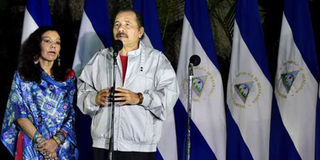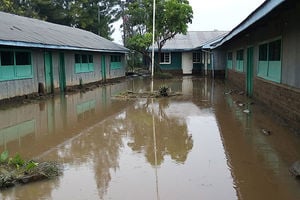Nicaragua’s leader Ortega wins fourth term

Nicaraguan President Daniel Ortega (right) delivers a speech next to his wife Rosario Murillo after voting in Managua during the presidential election on November 6, 2016. Ortega was on track to win a fourth term in office on Monday. PHOTO | AFP
What you need to know:
- But the opposition, sidelined by the leftist president, said it would not recognise the outcome and branded the vote a “farce.”
- With 66 per cent of ballots counted, Mr Ortega’s Sandinista National Liberation Front (FSLN) had 72 per cent of the vote.
- Ortega, a 70-year-old former Marxist rebel, has strong support from Nicaragua’s poor.
- Nicaragua’s powerful business interests have also been well-served by economic stability and security under Ortega.
MANAGUA
Nicaraguan President Daniel Ortega was on track to win a fourth term in office on Monday, with his wife Rosario Murillo as his vice president, partial official election results showed.
But the opposition, sidelined by the leftist president, said it would not recognise the outcome and branded the vote a “farce.”
With 66 per cent of ballots counted, Mr Ortega’s Sandinista National Liberation Front (FSLN) had 72 per cent of the vote, the country’s Supreme Electoral Council said in a report. That matched pre-election surveys indicating a big win for Ortega and the FSLN.
His nearest competitor, the right-leaning Liberal Constitutionalist Party, had just 14 per cent of the vote, the council said. Sunday’s vote was for the presidency and to choose legislators in the National Assembly.
Full official results will be given at 11:00 am on Monday, said the head of the electoral council, Roberto Rivas.
He earlier said turnout was 65 per cent, though the opposition gave a much lower estimate.
“We don’t recognise the results of this farce,” Violeta Granera, head of one of the opposition parties, the Broad Front of Democracy, told reporters before the partial tally. She said the opposition had calculated turnout at less than 30 per cent. She said the vote lacked legitimacy and showed “a high level of civil rebellion.” Ortega has been accused of being behind judicial manoeuvers to limit the power of the opposition.
Men armed with machetes and clubs set fire to one polling station in a rural area 300 kilometres east of Managua on Sunday.
Mr Ortega has controversially proposed building a transoceanic canal through the area, to rival Panama’s. But government and electoral officials described the elections as a formidable exercise in democracy, conducted in “calm.”
“It’s a vote for peace, for the security of the Nicaraguan people,” Ortega said after casting his ballot.
By his side, Murillo said the polling was “exemplary.”
MASSIVE INFRASTRUCTURE PROJECTS
Foreign observers were barred from monitoring the process. But some Latin American officials were invited to drop into polling stations to greet workers.
Ortega, a 70-year-old former Marxist rebel, has strong support from Nicaragua’s poor.
They account for more than a third of the population and have benefited from social programs.
Nicaragua’s powerful business interests have also been well-served by economic stability and security under Ortega.
But with billions of dollars in credit from troubled ally Venezuela drying up, and massive infrastructure projects — such as the mooted canal — failing to materialize, Nicaragua’s prospects are clouding over.
If the final results confirm his triumph, it would be the president’s fourth mandate.
Ortega has served two consecutive terms since 2007, and previously between 1985 and 1990, when his Sandinista rebels emerged victorious from a revolution that toppled a dictatorial dynasty.
Murillo, 65, already fills a prominent role as his government’s spokeswoman and is seen as possibly taking over as president in the future.
With Ortega increasingly reluctant to make public appearances, Murillo has stepped up — wearing trademark colourful dresses and ostentatious jewellery — as the administration’s daily face.
She has also left her mark on the capital, ordering the erection of tall, metal “trees of life” that decorate the main boulevard in bright colours.
“The practice of ‘couples in power’ is not exclusive to Nicaragua,” Veronica Rueda Estrada, a Nicaragua expert and professor at Mexico’s Quintana Roo University, told AFP.
She called to mind Cristina Kirchner, who succeeded her husband Nestor Kirchner as president of Argentina, and Hillary Clinton in the United States, who is vying to become president with her husband and former president Bill Clinton by her side.





